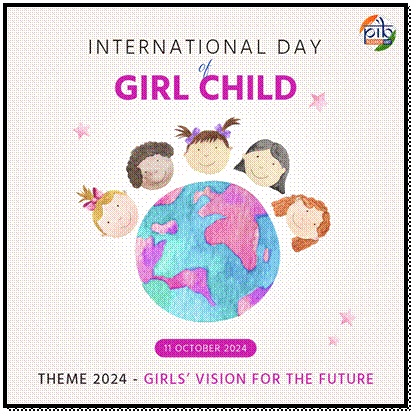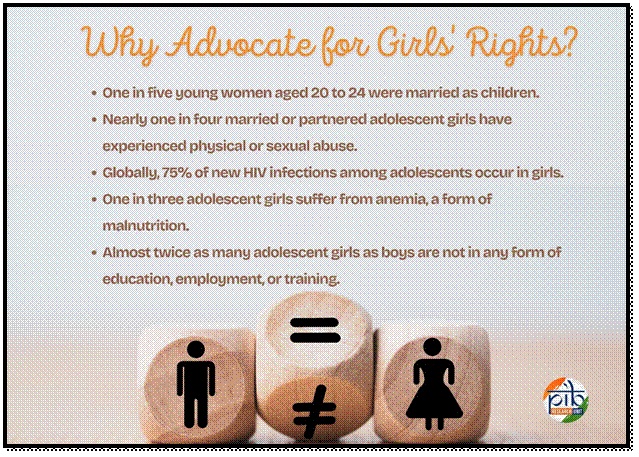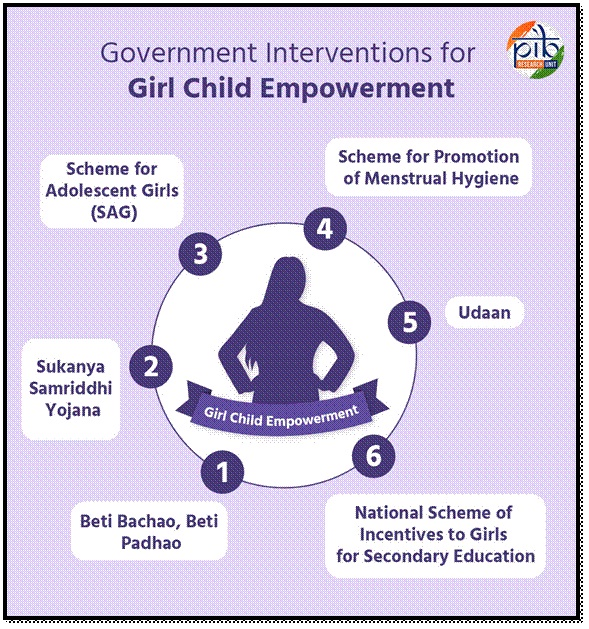International Day of the Girl Child: Empowering Future Leaders Through Equality and Education
The International Day of the Girl Child, celebrated annually on October 11, serves as a powerful reminder of the need to empower and protect girls worldwide. This day highlights the importance of gender equality, education, and opportunities for young girls. This day acts as a reminder to create an environment where girls can thrive, ensuring they are equipped with the tools to lead and shape their futures.

International Day of the Girl Child
In 1995, the World Conference on Women in Beijing marked a turning point for advancing the rights of women and girls worldwide. Countries unanimously adopted the Beijing Declaration and Platform for Action, the most progressive framework ever established to promote gender equality. For the first time, the declaration specifically acknowledged the distinct rights of girls and called for comprehensive global action to address their unique needs and challenges.
Building on this global momentum, the United Nations General Assembly passed Resolution 66/170 on December 19, 2011, designating October 11 as the International Day of the Girl Child. This day is dedicated to recognizing the rights of girls and raising awareness of the unique obstacles they face globally. The International Day of the Girl Child highlights the urgent need to empower girls and secure their human rights. It serves as a reminder that adolescent girls should have equal opportunities for education, safety, and healthcare, just as boys do. If girls are effectively supported during their formative years, they have the power to become the workers, entrepreneurs, leaders, and change-makers of tomorrow, driving social and economic transformation across the globe.
Girls’ Vision for the Future: Theme 2024
The theme of this year’s International Day of the Girl Child is “Girls’ Vision for the Future.” Research by UNICEF shows that girls, despite facing numerous challenges, remain hopeful and determined to create a better future. Every day, girls around the world are working toward a vision in which they are protected, respected, and empowered.
But they cannot achieve this alone. They need allies: governments, communities, and individuals—who listen to and respond to their needs. When girls are supported with the right resources and opportunities, their potential is limitless. And when they lead, the positive impact extends beyond themselves to their families, communities, and economies.
Why Advocate for Girls’ Rights?
The simple fact of being born a girl should not determine the scope of one’s future. Unfortunately, for millions of girls around the world, their gender still restricts their choices, limits their futures, and denies them basic rights. The statistics paint a sobering picture as shown in the following image:

However, these challenges are not insurmountable. With correct initiatives and collective efforts it is possible to fast-track progress toward a future where every girl has access to the health care, education, and skills necessary to succeed.
Gender Equality in the Indian Constitution
The Indian Constitution upholds the principle of gender equality. It not only guarantees equality to women but also empowers the state to take affirmative measures to counteract centuries of socio-economic and political discrimination. Women are granted fundamental rights that protect them from discrimination based on sex and gender. They are also entitled to equal protection under the law, and it is the duty of every citizen to uphold the dignity of women, free from derogatory practices.
Empowerment of women is more than just policy; it is a transformative process that allows women to claim equal opportunities across economic, cultural, social, and political spheres. This includes the ability to make decisions both inside and outside the home and to influence social change for a better future.
Schemes for Girl Child: Government Initiatives
The total population of Women is registered at 58.75 Crore,[1] as per the 2011 Census, underscoring the critical role of their empowerment and protection in fostering sustainable development. Ensuring their holistic growth is not only crucial for their individual well-being but also for the overall advancement of society. In particular, recognizing and upholding the rights and opportunities of girls is essential for building a more equitable future.

The Indian government has introduced a comprehensive range of schemes aimed at empowering girls, recognizing their pivotal role in society. Initiatives such as Beti Bachao, Beti Padhao and Sukanya Samriddhi Yojana underscore efforts to promote gender equality and secure the future of girls by encouraging savings for education and marriage. Launched in 2015, the Sukanya Samriddhi Yojana allows parents to invest in their daughters’ futures, ensuring financial security and equal opportunities. In addition to these, the Scheme for Adolescent Girls (SAG) and the Scheme for Promotion of Menstrual Hygiene address health and nutritional needs among women. Udaan is an innovative project launched in 2014 aims at addressing the low enrollment of girl students in prestigious engineering institutions and bridging the gap between school education and engineering entrance examinations. The National Scheme of Incentive to Girls for Secondary Education (NSIGSE), launched in May 2008, aims to enhance educational opportunities for girls, particularly those from Scheduled Caste (SC) and Scheduled Tribe (ST) communities. while Educational initiatives like Udaan and the National Scheme of Incentives to Girls for Secondary Education are designed to improve access to education and reduce dropout rates.
Further, Legal measures to empower and protect the girl child include several key initiatives. The Prohibition of Child Marriage Act, 2006, aims to eliminate child marriage by penalizing those involved. The Protection of Children from Sexual Offences (POCSO) Act, 2012, addresses child abuse, with updated rules in 2020 to enhance its implementation. The Juvenile Justice Act, 2015, ensures the care and protection of children in need. Mission Vatsalya focuses on child development and protection, with services like the Child Helpline and the Track Child portal to assist missing children. Track Child portal has been made functional since the year 2012. This portal facilitates the matching of ‘missing’ children being reported at Police stations with those ‘found’ children who are residing in the Child Care Institutions (CCIs). The PM CARES for Children Scheme supports children orphaned by COVID-19. Additionally, collaborations with NIMHANS and the E-SAMPARK program provide mental health and medical care.
Together, these efforts foster a secure environment, promoting the rights and well-being of girls in India.
Call to Action
The need for urgent action to support girls cannot be overstated. Investing in girls’ futures is a direct investment in the collective future of our global society. This International Day of the Girl Child, let us reaffirm our commitment to championing the rights of every girl and helping them realize their full potential. The time to act is now, for when girls thrive, society thrives!

